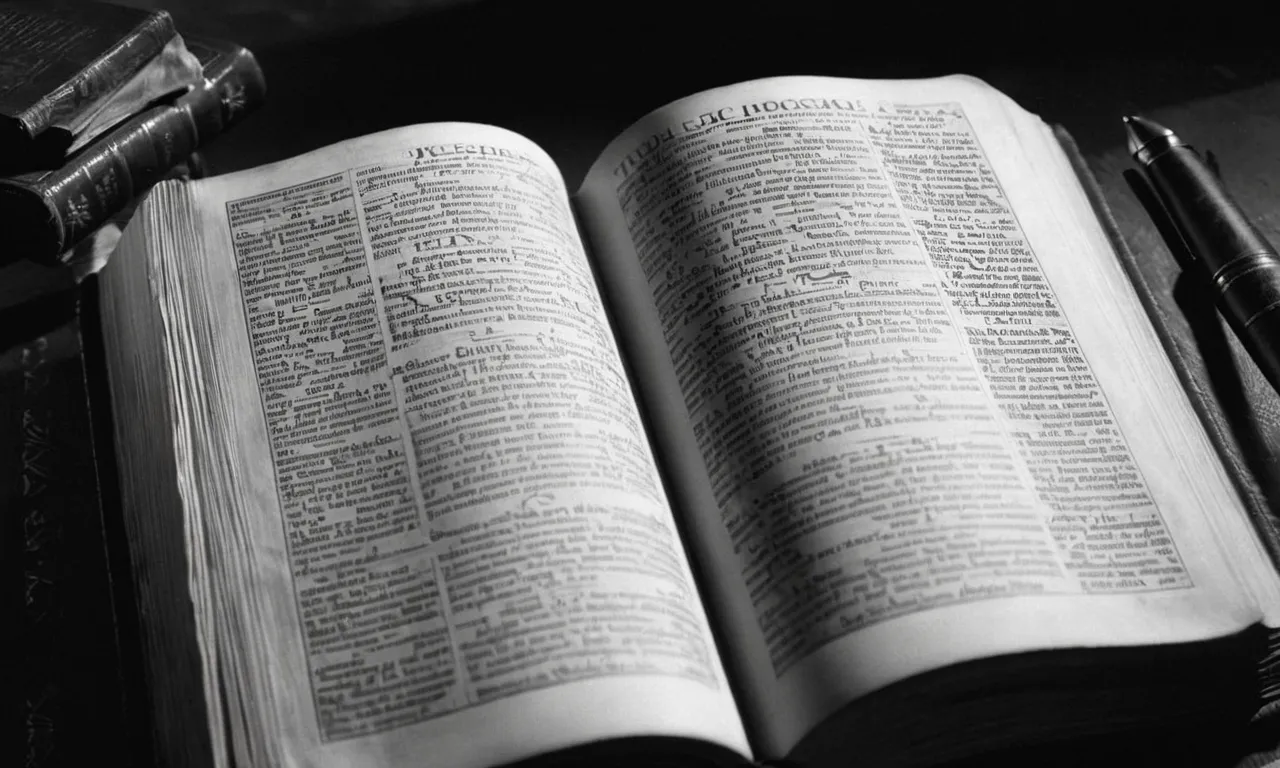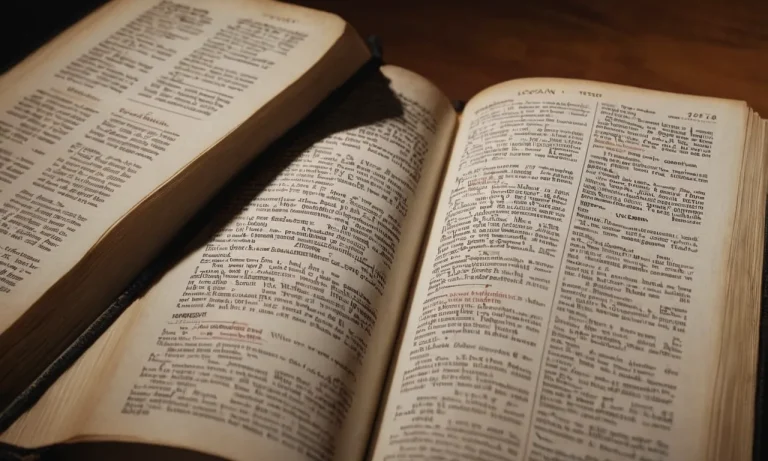Who Were The Judges In The Bible?
The time of the judges was an important period in biblical history when Israel was ruled by leaders known as judges. If you’re short on time, here’s a quick answer: The judges were leaders of the Israelites between the time of Joshua’s conquest of Canaan and the establishment of the monarchy with Saul and David.
They served as political, military, and spiritual leaders during this time.
In this comprehensive article, we will explore the judges in depth – who they were, the role they played, the challenges they faced, and the legacy they left behind. We will examine key judges like Deborah, Gideon, and Samson while analyzing the overarching themes of this impactful period.
The Role and Purpose of Judges in Israel
Temporary Leaders
The judges in the Bible served as temporary leaders and deliverers before Israel had kings. God raised up judges at times when the Israelites turned away from Him and suffered under foreign oppressors as a consequence.
The judges were charismatic leaders chosen by God to defeat Israel’s enemies, rally and unite the tribes, and enforce God’s laws until they died (Judges 2:16-19).
Some well-known judges include Othniel, Ehud, Deborah, Gideon, Jephthah, and Samson. These judges did not inherit their positions but were gifted as military leaders, diplomats, and executors of justice.
Their memorable accomplishments delivered Israel from domination by foreign powers like Moab, Midian, and Philistia for a generation or more. But after each judge died, the Israelites would eventually stray from God again, spurring the Lord to allow a new oppressor to subdue them until He mercifully raised up another judge to save them when they cried out to Him (Judges 2:11-23).
Deliverers and Enforcers of God’s Law
The Bible presents the judges as deliverers and enforcers of God’s Law (Deuteronomy 16:18-20). As deliverers, the judges rescued the Israelites from hostile foreign domination when the tribes were disunited and weak both militarily and spiritually.
The judges unified the people and turned them back to God, making renewed obedience to the Lord a prerequisite for defeating Israel’s foes. As enforcers of God’s Law, judges functioned as magistrates or governors administering justice, resolving disputes between tribes, cities and individuals, and enforcing the covenant obligations of the Mosaic Law.
Their administration of justice reflected the supreme judge character of God Himself (Psalm 9:7-8).
Some estimates count 15 judges who led Israel over a 350+ year span between conquest of Canaan and the establishment of kingship under Saul. By properly enforcing godly laws and delivering the people from foreign oppressors, judges were citizens of courage and conviction who served a greater purpose – reminding Israel of their true Deliverer and King, the Lord God Himself.
Their leadership reinforced to the Israelites the importance of obeying God’s laws and relying completely on His sovereign protection.
Qualifications and Appointment of Judges
In ancient Israel, judges were seen as God’s representatives and were appointed to lead the Israelites according to God’s laws. The qualifications and appointment process for judges is described in several parts of the Bible.
Qualifications
The Bible sets forth some key qualifications for judges in Exodus 18:21: “But select capable men from all the people—men who fear God, trustworthy men who hate dishonest gain—and appoint them as officials over thousands, hundreds, fifties and tens.”
This passage emphasizes selecting men who were godly, honest, and capable. Other desired qualities included wisdom, discernment, and knowledge of God’s laws.
Examples of well-qualified judges include Moses, Samuel, Ezra and King Solomon. Moses led the Israelites out of Egypt and judged disputes and gave guidance during their wilderness wanderings (Exodus 18:13-16).
Samuel judged all Israel throughout his lifetime and was known for his leadership and integrity (1 Samuel 7:15-17). Ezra was a priest and teacher “well versed in the Law of Moses” who led a revival of God’s laws (Ezra 7:6, 10).
King Solomon demonstrated immense God-given wisdom in judging disputes during his reign (1 Kings 3:16-28).
In the New Testament, the emphasis shifted to spiritual qualifications for church leaders, including being “above reproach, faithful to his wife, temperate, self-controlled, respectable, hospitable, able to teach” (1 Timothy 3:2).
However, the desired qualities of honesty, integrity and capability remained important.
Appointment Process
In the book of Exodus, Moses appoints judges for the Israelites based on the counsel of his father-in-law Jethro: “Select capable men from all the people—men who fear God, trustworthy men who hate dishonest gain—and appoint them as officials over thousands, hundreds, fifties and tens” (Exodus 18:21).
This set a precedent for appointment based on qualification rather than heredity or popularity.
Later, the prophet Samuel travelled “from place to place” to appoint judges to lead Israel, demonstrating a more decentralized process guided by a prophet (1 Samuel 7:16-17). King David also appointed judges throughout Israel (2 Samuel 8:15).
During the later monarchy, though, many ungodly kings manipulated the judiciary by appointing judges based on loyalty rather than qualifications.
In the New Testament church, the focus shifted from appointment of judges to selection of elders and overseers based on spiritual maturity and teaching ability (1 Timothy 3:1-7, Titus 1:5-9). Still, the early precedent of decentralized, qualifications-based appointment continued to influence the process.
Key Judges and Their Stories
Deborah – Israel’s Only Female Judge
Deborah was an amazing woman who served as a judge over Israel during a time of oppression by Canaanite king Jabin. Though a mother and wife, Deborah displayed tremendous leadership by rallying Barak and the tribes of Israel to confront Sisera, the commander of Jabin’s army.
Through prophetic wisdom and military strategy, Deborah helped secure victory for the Israelites. Her story reveals how God empowered even the most unlikely people to deliver His people.
Gideon and His Fleece
Gideon was hesitant to lead Israel against the Midianites until God gave him a sign using a fleece. On two occasions, Gideon put a wool fleece on the threshing floor and asked God to make it wet while keeping the ground dry, or vice versa.
God graciously granted these signs, demonstrating that He would be with Gideon. Emboldened, Gideon assembled an army of 300 men and implemented a creative battle plan involving torches and trumpets. This led to a resounding victory.
Though flawed, Gideon exemplifies how God patiently worked through a doubting leader.
Jephthah’s Tragic Vow
Jephthah made a rash vow to sacrifice as a burnt offering “whatever comes out of the door” of his house if God granted him victory over the Ammonites. Tragically, his daughter was the first to come out to celebrate when he returned home.
Though devastated, Jephthah kept his vow, and his daughter nobly accepted her fate. This heartbreaking story illustrates the importance of wisdom and self-control when making promises to God. Jephthah was an effective leader but one uncontrolled vow resulted in irreversible consequences.
Strongman Samson
Samson is famous for his herculean strength and long hair which was the secret to his power. However, he had a weakness for Philistine women. Samson married one named Delilah who exploited this vulnerability. After three attempts, she succeeded in getting Samson to divulge his secret.
The Philistines then captured Samson and gouged out his eyes. In a final act, Samson pushed down the pillars of a Philistine temple, killing the people inside along with himself. Samson achieved some victories but lacked self-discipline. His story is one of giftedness and tragedy.
Cycles of Sin Under the Judges
The period of the Judges in the Bible was characterized by a repeating cycle of sin, oppression, repentance, and deliverance. According to the book of Judges, the Israelites would fall into sin and idolatry, turning away from God.
As a result, God would allow foreign enemies to oppress and dominate them. This oppression would continue for years until the Israelites cried out to God in repentance. At that point, God would raise up a judge to deliver them militarily and govern them for a period of peace, beginning the cycle anew.
One clear example is found in Judges 3. The Israelites sinned against God by worshipping Canaanite gods. So God allowed the king of Aram to oppress them for eight years. Eventually, the Israelites cried out to the Lord, who raised up Othniel to deliver them.
Under Othniel’s leadership there were forty years of peace before the cycle began again (Judges 3:7-11).
This cycle is summarized well in Judges 2:11-19, which describes how the Israelites would forsake God, provoking His anger to the point He would deliver them over to raiders and enemies. When hardship came upon them, they would cry out to God who would send judges as deliverers.
But after each judge died, the Israelites would return to sin, continuing the cycle.
The moral failure of the Israelites stands in stark contrast to God’s faithfulness. Despite their repeated sins, He continued to rescue them when they repented. The years of peace under the judges were due solely to God’s mercy and compassion on His people.
Time and again God proved Himself willing to forgive and restore them.
Several important principles emerge from these cycles under the judges:
- God hates sin and will discipline those He loves in order to produce repentance (Hebrews 12:6).
- Complete deliverance from sin is found not through human judges, but in Christ alone (Colossians 1:13-14).
- Repentance is a necessary part of receiving God’s forgiveness and restoration (Acts 3:19).
- God is patient, merciful and willing to forgive His people’s sins over and over (Exodus 34:6-7).
The judges clearly foreshadow God’s ultimate deliverance through His Son Jesus. While the judges provided temporary leadership and military protection, Jesus gives spiritual liberation from slavery to sin for all eternity.
The failures of Israel under the judges highlight humanity’s need for a perfect Savior and King.
Legacy and Impact of the Judges Era
The period of the judges in the Bible marked a pivotal time in Israel’s history. Though a turbulent era characterized by cycles of apostasy, oppression, repentance, and deliverance, the judges left an enduring legacy.
Political Legacy
Politically, the judges ushered in a decentralized system of governance for Israel. With no king, the tribes retained independence while uniting to face common threats. This fostered tribe identity while necessitating cooperation.
Though not an ideal system, it suited the needs of Israel’s formative period as a nation.
Spiritual Legacy
Spiritually, the era established a pattern of waywardness, discipline, and renewal for Israel. Their struggles with idolatry taught hard lessons about the consequences of disobedience and the faithfulness of God when they repented.
While tragic, this cycle shaped Israel’s spiritual life for centuries. Through the ups and downs, God patiently worked to bring Israel back to Himself.
Impacts on Leadership and Gender Roles
The judges also expanded traditional leadership roles in Israelite society. Leaders emerged organically from various tribes and regions, highlighting capability over pedigree. Moreover, Deborah broke gender barriers to judge and lead Israel with distinction.
Her courage and wisdom demonstrated that God can use anyone open to His call. This precedent paved the way for future female leaders in Israelite society.
Cultural and Military Impact
On the cultural front, the judges era further cemented Israelite identity and solidarity. Tribes were compelled to unite against imposition of foreign religious and social practices. Militarily, the period was characterized by guerilla warfare and charismatic native leadership.
The major judges were warrior-poets like Gideon and Samson, pioneers of insurgency in Canaan. Their unconventional exploits highlight how God leverages underdogs to achieve the impossible when obedient to His plans.
In many ways, the judges built the spiritual, social, and military backbone of the future Israelite monarchy. They paved the way for transition to centralized rule under Saul and David – uniting tribes, honing warfare tactics, and spurring cultural cohesion.
A chaotic period, yes, but one that taught indelible lessons and laid the groundwork for Israel’s greatest triumphs.
Conclusion
The judges occupy an intriguing place in Israel’s history between the conquest under Joshua and the rise of the monarchy. They were imperfect deliverers raised up to lead Israel amidst cycles of rebellion against God.
While flawed as individuals, God worked through the judges to carry out His purposes during this chaotic era. Their stirring stories highlight God’s faithfulness towards wayward Israel and the outworking of His redemptive plan.








